
- Home
- The Tes profile: Academy chief Jo Saxton
The Tes profile: Academy chief Jo Saxton
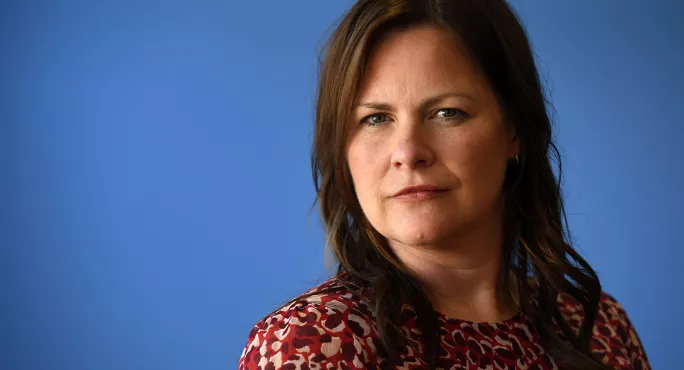
If you want to find the source of Jo Saxton’s passion for education, there is no better place to start than her family tree.
The chief executive of Turner Schools, a Folkestone academy trust trying to address the educational problems of a deprived coastal community, was born Juliette-Jo.
"Juliette" comes from her paternal grandmother, Juliette Turner. She lived in Kent, was an English teacher, and, Saxton says, became one of the first women in England to get a degree.
“Although she didn’t have a particularly privileged background, her education got her around some influential tables,” Saxton says.
“Her husband was involved in naval education in India around the time of partition, and so she sat next to Nehru at dinners.
“Because she felt so confident in her education, she was comfortable around those tables, and so I think she really drove education as the thing that gives you opportunities.”
Turner Schools is named after her.
"Jo" comes from her maternal grandfather, an illegitimate child coal miner in Sunderland who “legend has it had to walk two miles to the pit without shoes, and they gave you boots at the pit and then took them away at the end of the day.
“Ultimately, he and his mate cut each others’ fingers off with a lathe at the pit so that they could get to go to school.”
Saxton reflects that “through both of them, I just felt how important education was”.
An invitation from Ed Balls
Although she may not be a household name, Saxton is an influential figure, having advised government commissions, led a minister’s academy trust, written extensively, and joined the board of the exams regulator Ofqual.
But her introduction into the world of national policy came by chance.
Back in 2007, she was teaching one day a week at St Matthew’s Primary, tucked behind the Department for Education’s headquarters in Westminster, when it was chosen as the venue for the then secretary of state for children, schools and families to launch his Children’s Plan.
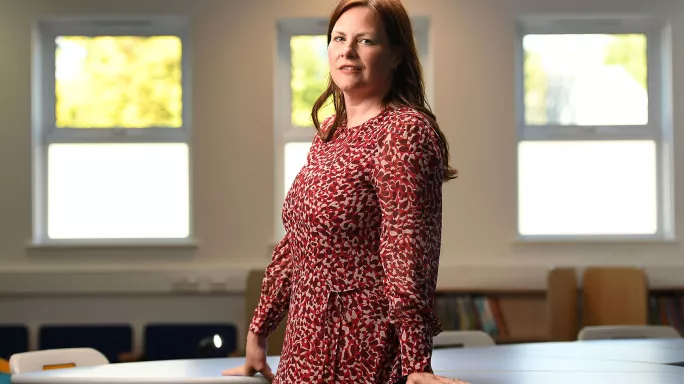
“The headteacher at the time said, ‘Do you mind if I show you off?' and had me teach a lesson, and Ed Balls had to sit in,” she recalls.
“We were basically teaching them history, geography, science, and afterwards he said, ‘How did you get those kids to know so much?', and so we started chatting, and in the end he said, ‘We are about to do a review of the primary national curriculum. Come and meet the people.'”
This piece of work was the Rose Review, where she gave several rounds of feedback on the drafts, and when looking at what other schools were doing, Saxton felt discomfort at what was missing from the education some children received.
She explains using the example of teachers who would say that they had "taught the Victorians" because they had completed a unit called "seaside holidays in the past", but covered the topic without pupils learning there was a Queen Victoria, or how people travelled by rail, or about coastal erosion.
“I began to see it was the most disadvantaged who weren’t getting the spine of what makes seaside holidays be anything other than role play and writing something home,” she adds.
Looking for alternative approaches, she came across the work of ED Hirsch, the American education guru beloved of traditionalists like school standards minister Nick Gibb, and who emphasises the importance of cultural literacy.
“It chimed with me instantly because he talked about the thing I had experienced when I was teaching at Cambridge [University], of having a very wealthy and a disadvantaged kid together around the same table, and not being able to teach them the same thing in the same way because they did not have the same cultural references.”
A stark example came during an art lesson: “One kid around the table, his grandparents owned the Canaletto we were looking at, and another kid at the table had never been outside England.”
It was experiences like this that saw her career trajectory shift decisively from academia to schools.
An 'incredibly privileged' education
Of her own school days, Saxton says her parents “wanted me to have the perfect education, so I had an incredibly privileged private education”.
There were difficulties at home, with a brother who was later diagnosed as a paranoid schizophrenic, and “so for me academic school work was a mental escape from things that were going on in the house, and later a physical escape because it got me to university, quite away from home, let me go overseas and work abroad.”
Although she says she was “not very happy” at St Paul’s Girls’ School in Hammersmith, it was “full of adults with such extensive knowledge that it was incredibly inspiring”.
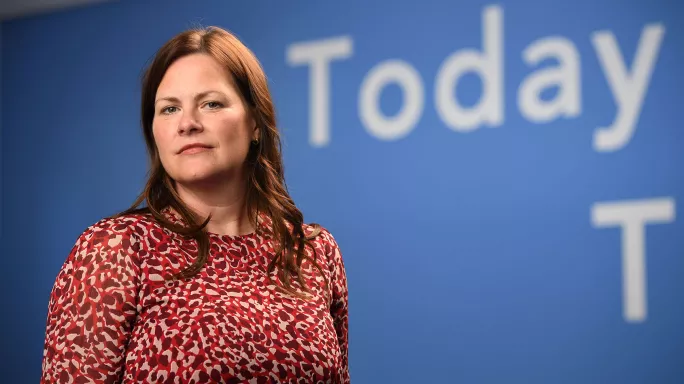
She would later write Twenty-two things excellent schools do, which outlined lessons all schools could learn from successful private institutions.
The research for the book took place during maternity leave for her second child – something that gives a clue to Saxton’s somewhat workaholic nature.
During her first maternity leave, she took a chemistry A-level equivalent, while her project during her third maternity was more impressive yet.
Late one night, she was making her daughter’s birthday cake based on Matisse’s artwork The Snail, which the youngster had seen on a school trip to the Tate.
“Playing with the coloured icing, I thought, ‘There’s a character here’, and was frustrated as well with art books for young children, which make up ridiculous stories when within the art there is already so much that is of integrity to talk about.”
So she illustrated and wrote what she describes as a “little tiny book” – Snail Trail, In Search of a Modern Masterpiece - which has been added to the National Poetry Library’s collection, and been translated into Chinese and Korean.
'Schools felt more important'
As an academic, she experienced bright students at Cambridge who struggled to articulate their own thoughts about topics, and Saxton started to think increasingly about the school system that had produced them.
She volunteered at her daughter’s school, and then others, “and found I absolutely loved it”.
“My former Cambridge colleagues wouldn’t like me saying it, but schools felt more important,” she says now.
“Academia, particularly in the arts, can push the sense of it being about the footnote of a footnote of a footnote, and actually ‘Can we get more kids to read?’ is really big, and I like the big picture.”
So Saxton became a teacher. And when the prominent academy chain Ark was preparing to open a new school, it hired her to do curriculum work that would “make history, geography, art and science teachable in a few lessons a week”. She wrote a curriculum that went from Reception to Year 3 or 4.
And then a copy of Twenty-two things landed on the desk of John Nash.
At the time, the venture capitalist was a non-executive member of the DfE’s board; he was later ennobled as Lord Nash, becoming the minister overseeing the academy system.
In 2011, Nash brought Saxton into Future Academies, the trust he and his wife set up, and as a curriculum consultant she was given the task of examining key stage 3 – long before Ofsted made it a topic of wider concern.
Instead of covering William the Conqueror in Year 7 history, she started with the ancient near east.
“Initially, some of the teachers were ‘How can this be relevant to kids that live in tower blocks?’. And it was wonderful to be able to say ‘How could it not be relevant to learn about the first cities that were also built by rivers where the first laws were written down, we had the first lending libraries, the first musical ensembles?', and it went on from there.”
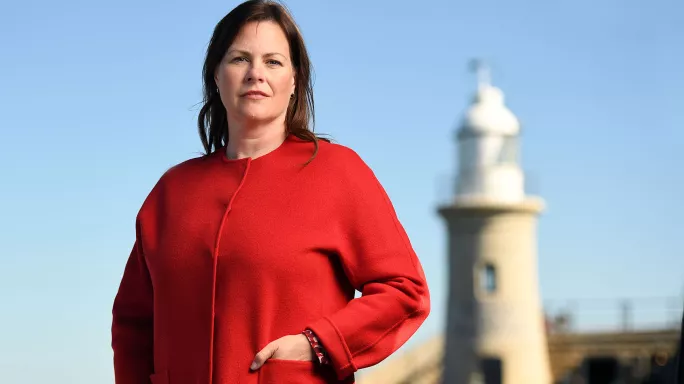
She eventually became CEO of Future Academies. It only had four schools, but when Nash became a minister “what became very difficult was the media attention”.
She cites as an example the decision to make John Lewis the uniform supplier for one of its schools.
The reason, she says, was that parents wanted to be able to order online 24-7, it had a store nearby, and disadvantaged children would still get free uniforms, but “they still went to the press and said they are moving it to this posh supplier, and that was in a news story. That was really, really frustrating.”
'I think Angela Rayner is so cool'
Saxton may be one of the few academy CEOs who does not seem unduly concerned by proposals announced by Labour shadow education secretary Angela Rayner last month to clip the wings of multi-academy trusts and increase local democratic oversight of academies.
Given that Saxton’s passion for curriculum was what brought her into schools in the first place, this may not be as surprising as it first sounds.
“Does it worry me? It’s doesn’t really worry me,” she says. “I guess I’m interested in substance, not structures, and I think I would find a way to continue working with schools whether or not there is a CEO-of-an-academy-trust post.”
Indeed, Saxton describes herself as “a huge Angela fan. I think she’s so cool.”
She adds: “I just think her drive and her determination, her recognition of how powerful education is, I just love it. I think it’s really exciting in politics at the moment that we’ve got some really driven, eloquent women leading.
“It’s been quite exciting with [Labour MP] Rosie Duffield winning in Canterbury, having been Conservative forever. I just love these forthright women.
“I think [Rayner] really believes in communities, and that’s what we are trying to do here in Turner Schools, be a community.”
Not that she thinks Labour’s direction is without flaws.
“Where I disagree is that Kent is the largest authority in the country, I think. The local authority couldn’t operate in the community sense here.
“As a little academy trust with tight geography, that’s what we’re trying to do. We are trying to be a family of schools; we are trying to be a community.”
Picking up the pieces
Saxton’s move to Kent, and setting up Turner Schools, came in 2016.
The motivation for setting up the Folkstone-based trust was partly practical – her move out of London had led to a four-hour commute. But she also wanted to do something to improve local schools, and "at the same time the Metro was full of ’20 of the country’s worst secondary schools are in Kent’".
“I tried for a while to persuade John [Nash] to get involved in Kent, but he said ‘I won’t go south of the Oval’, and when he was a minister the Cabinet Office wasn’t going to let Future take on other schools.
"I was very motivated in trying to see if we could replicate what we had done in Pimlico in a coastal context.
“I think I liked the challenge of there being a sense of ‘You can’t do that with the big non-selective schools in a selective area’, and we are a very, very long way from having done it yet, but I’m not giving up until we have.”
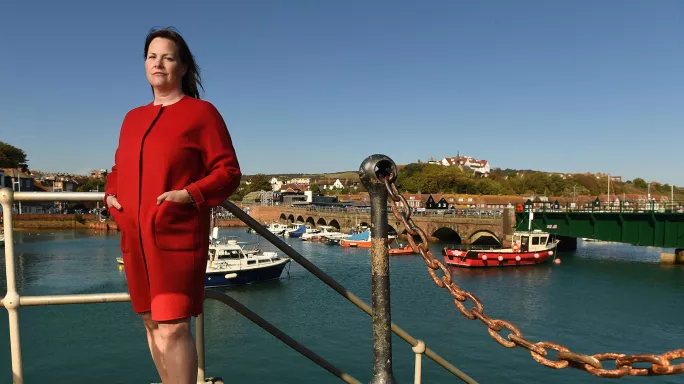
The original plan was to start with a new secondary free school in Folkestone – Turner Free School, which opened last month – but then she was asked to help pick up the pieces following one of the most notorious failures of the academy system: Lilac Sky.
The academy trust, which had nine schools in Kent and East Sussex, received a financial notice to improve in 2016 because of “significant irregular financial and governance practice over a number of years”, and all its academies were to be rebrokered to other trusts.
Turner took on two Lilac Sky primaries because “it was the right thing to do”, but “what was quite surprising was how we were just not welcomed by the community because they had really bought into Lilac Sky – they liked the vision”.
At the time, Turner Schools was unable tell parents about the scandals that had prompted their involvement.
“What happened there was quite shocking, and I hope not to have to work in that situation again, really. It was shocking in terms of one of our schools, the heating didn’t work, and hadn’t for several years. It just seemed to have become normal.
“The other one had very few books, and people were not banging down the doors saying ‘Why don’t our kids have more books to read?’. It was how what was happening had just become very normal that was odd.”
Lilac Sky was a harbinger of things to come, with all the schools run by Wakefield City Academies Trust, Bright Tribe and the Education Fellowship Trust since undergoing similar rebrokering processes.
So what has Saxton learned about how to turn around academies that have been failed by a previous sponsor?
“I think the short answer is there aren’t quick fixes," she says.
“We spent a huge amount of time that first year investing heavily in training teachers, working with them on robust, exciting curriculum.
“We wanted to use that to bring everybody together and remind everyone of what the main thing is, and what we are really here to do.”
Particularly painful was the fate of some overseas teachers who had used their life savings to come to England from countries as far away as New Zealand. Because Lilac Sky, not Turner Schools, was their visa sponsor, they had to leave the UK.
The Turner University
As for Turner Schools’ future, Saxton says “I would definitely like to help more children have a better education, but as a trust we also think it’s quality over quantity, and we still have a big job to do with the schools we have got.”
She wants it to get involved in teacher training, “not least because at Future it really helped with recruitment” – a stubborn problem facing many schools in deprived areas.
And intriguingly, Saxton has an idea for what she calls “cradle to career provision”.
“With my university experience and my chairman, who’s a university vice-chancellor, we are thinking how we get into further and higher education, so we would love to have Turner University at some point.
Juliette Turner’s legacy could yet grow much bigger.
Jo Saxton: CV
Education
1977–1984: Unicorn School, Kew
1984–1986: Putney High School
1986–1990: St Paul’s Girls’ School
1990–1993: Cambridge University, 2:I (BA Hons) Part I Archaeology and Anthropology; Part II History of Art
1994–1996: New York University: MA History of Art and Architecture (plus languages French, Dutch and German)
1996–2003: New York University: PhD, minor field: Ancient Aegean Art & Culture, major field: 17th Century Northern European Art & Culture
2002-2012: Academia and teaching
Richmond, American International University, assistant professor (Western and non-Western art and history)
Syracuse University, assistant professor (Western art history)
Cambridge University, affiliated lecturer (History of Art and Architecture and Classics Department)
University of Kent, Sabbatical cover (History and Philosophy of Art)
Teaching at various maintained and academy schools
2005-present: Education consulting/advisory work:
SSAT literacy consultant
Rose Independent Review of the Primary National Curriculum
Temple Grove Trust / Nick Gibb (22 Things Excellent Schools Do)
Civitas (Core Knowledge Project)
DfE external advisor on Oates National Curriculum Review
EY educator panel, EY advisor to Ofsted
Graduate Teaching Apprenticeship Standard development group
2011-2016: Future Academies: Curriculum consultant; founding director of Future’s ‘The Curriculum Centre'; director of education; CEO; executive director
2016-present: Turner Schools, founder and then CEO
2017-present: The Brilliant Club, trustee
2018-present: Ofqual, ordinary member of the board
Select publications:
- Nicolaus Knupfer (1603/09 -1655): An Original Artist. Monograph and Catalogue Raisonne (Davaco)
- 22 Things Good Schools Do (Temple Grove Trust)
- Snail Trail: In search of a modern masterpiece (Frances Lincoln)
- What your Year 1-3 etc needs to know (author of visual arts, contributor to other bits including online curriculum) Civitas and Core Knowledge UK
- The ITT we need and why we don’t have it (Policy Exchange report)
Register with Tes and you can read five free articles every month, plus you'll have access to our range of award-winning newsletters.
Keep reading for just £4.90 per month
You've reached your limit of free articles this month. Subscribe for £4.90 per month for three months and get:
- Unlimited access to all Tes magazine content
- Exclusive subscriber-only stories
- Award-winning email newsletters
You've reached your limit of free articles this month. Subscribe for £4.90 per month for three months and get:
- Unlimited access to all Tes magazine content
- Exclusive subscriber-only stories
- Award-winning email newsletters



